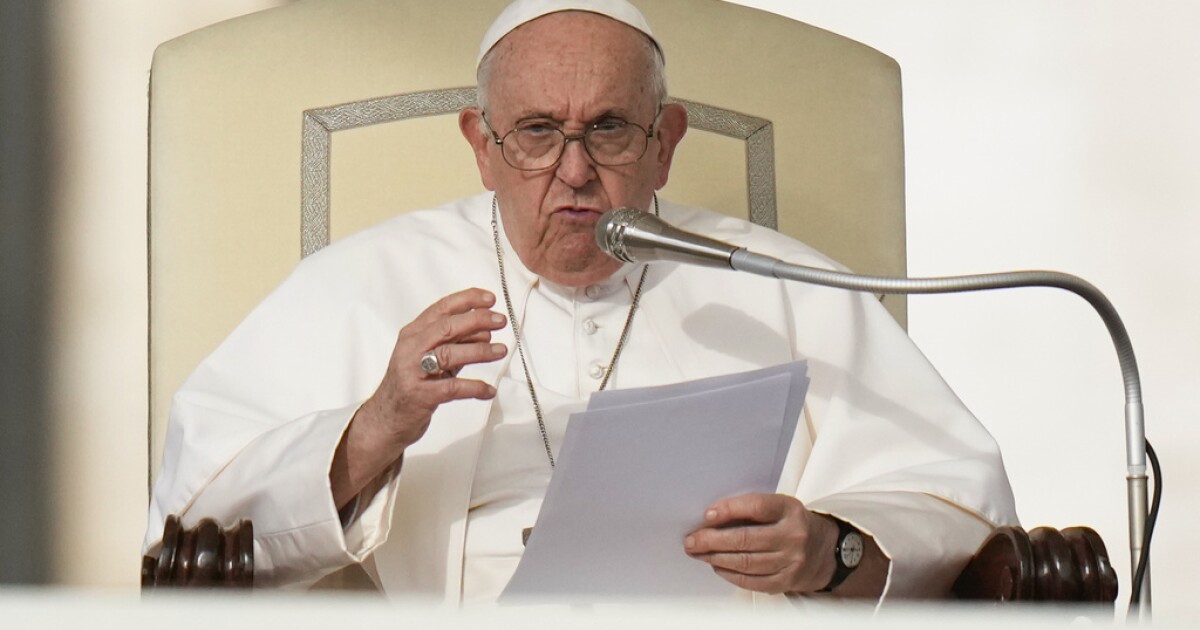

Pope Francis and the Vatican‘s office for Catholic doctrine released a document Monday clarifying that couples in “irregular situations,” including same-sex relationships, are able to receive blessings that do not validate their relationships.
The document “Fiducia Supplicans,” which was signed by Pope Francis, indicates that a priest may offer a blessing “outside of a liturgical framework” to couples in “irregular situations,” including in same-sex relationships, and that these blessings can be done “without officially validating their status.”
BIDEN’S AUTO SAFETY OFFICIAL FORCED TO RESIGN FROM TEMPORARY ROLE
The document outlines the theological and historical understanding of blessings within the Catholic Church before explaining the situations in which people in a same-sex or “irregular” relationship can receive a blessing from a priest. The document also notes that such a blessing does not impart the church’s approval of such relationships and expressly states that same-sex couples are excluded from receiving blessings in any sort of ceremony that even resembles a wedding.
“Rites and prayers that could create confusion between what constitutes marriage — which is the ‘exclusive, stable, and indissoluble union between a man and a woman, naturally open to the generation of children’ — and what contradicts it are inadmissible,” it reads. “This conviction is grounded in the perennial Catholic doctrine of marriage; it is only in this context that sexual relations find their natural, proper, and fully human meaning. The Church’s doctrine on this point remains firm.”
Instead, the document notes priests should only give “spontaneous blessings” and that the Church does not provide a formula for them in its Book of Blessings. A priest giving such a blessing is directed to offer a prayer, if desired, that “ask[s] that the individuals have peace, health, a spirit of patience, dialogue, and mutual assistance — but also God’s light and strength to be able to fulfill his will completely.”
According to the document, “blessings should be evaluated as acts of devotion that ‘are external to the celebration of the Holy Eucharist and of the other sacraments,'” priests should ensure such blessings are simple, and “attempts to impose forms of ‘liturgical celebration’ on them are always to be avoided.”
“Through these blessings that are given not through the ritual forms proper to the liturgy but as an expression of the Church’s maternal heart — similar to those that emanate from the core of popular piety — there is no intention to legitimize anything, but rather to open one’s life to God, to ask for his help to live better, and also to invoke the Holy Spirit so that the values of the Gospel may be lived with greater faithfulness,” it reads.
“Spontaneous blessings” are common practice in the Catholic Church. They usually occur when someone asks a priest for said blessing, and after a brief and typically impromptu prayer, the priest will make the sign of the cross over the person.
The document release comes a month after Cardinal Victor Manuel Fernandez, the prefect for the Dicastery for the Doctrine of Faith, released a “responsa ad dubia,” or response to a question, that asked if priests were permitted to offer blessings to people in same-sex relationships. Fernandez, in his response, iterated many of the same points that were included in Monday’s document while again noting that such blessings cannot be confused with a marriage blessing.
CLICK HERE TO READ MORE FROM THE WASHINGTON EXAMINER
Since Fernandez took over as the dicastery’s prefect in September, the Vatican and Pope Francis have released several documents and statements that have sought to clarify the Church’s position on controversial topics but, in some cases, have had the effect of sowing confusion.
Last month, in another response to a dubia, Fernandez said children raised by a same-sex couple can be baptized on the condition that “there [is] a well-founded hope that [the child will] be brought up in the Catholic religion.” The Vatican also said last week that single mothers who have gone to confession are allowed to receive Holy Communion.





